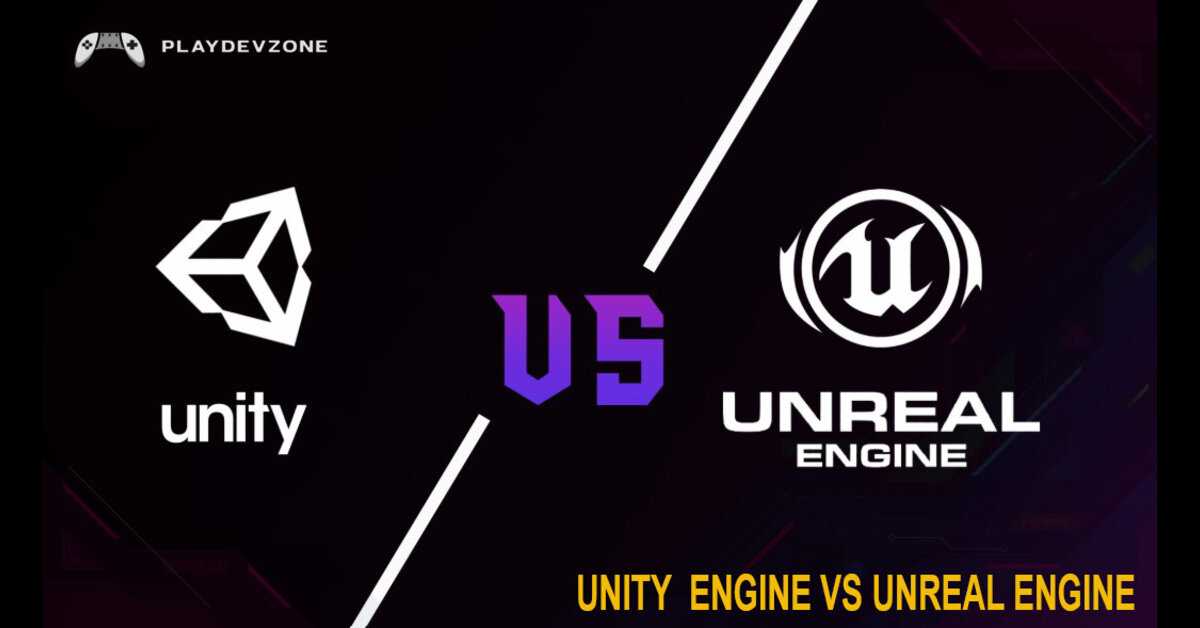Are you planning to build your own 2D game but struggling to choose between Unity and Unreal Engine? You’re not alone (unity engine vs unreal engine).
With so many game engines available today, selecting the right one can feel overwhelming, especially when your project, time, and budget are on the line.
Two of the most potent engines, Unity and Unreal, are often compared, but when it comes to 2D game development, the choice becomes more specific.
This guide dives deep into the core differences between Unity and Unreal Engine when it comes to developing 2D games, helping you choose the right platform for your project.
Whether you’re a beginner, indie developer, or studio looking to optimize performance and monetization, this guide will help you make the smartest choice for your game.
From ease of use and performance to ad integration and platform support, we’ve covered everything you need to know.
By the end of this post, you’ll know exactly which engine suits your 2D game idea and why it matters more than you think.
What is Unity?
Unity is one of the world’s most popular game development engines, widely used for creating both 2D and 3D games.
Known for its user-friendly interface and powerful features, Unity allows developers of all skill levels to build games for mobile, desktop, console, and web platforms.
It supports C# scripting, offers a massive asset store, and includes dedicated 2D tools like Sprite Editor, Tilemap, and Animation system, making it ideal for 2D game development.
Whether you’re an indie developer or part of a professional studio, Unity provides the flexibility and scalability needed to bring creative ideas to life.
Its free tier and cross-platform capabilities make it a top choice for building and monetizing 2D games with ease.
What is Unreal Engine?
Created by Epic Games, Unreal Engine is a state-of-the-art game development tool celebrated for its powerful real-time rendering and stunning visual fidelity, enabling developers to craft immersive and visually impressive experiences.
It empowers creators to build immersive, graphically rich experiences across gaming, film, and virtual production.
While it’s widely used for high-end 3D games, virtual production, and simulations, it also offers tools for 2D game creation through its Paper2D plugin.
Unreal Engine uses C++ and a visual scripting system called Blueprints, making it flexible for both programmers and non-coders.
It supports cross-platform development and delivers cinematic-quality visuals, making it a top choice for AAA studios and experienced developers.
Although not specifically optimized for 2D, Unreal can be used to build 2D games with excellent performance, especially if your project blends 2D and 3D elements.
Unity vs Unreal Engine for 2D Games
When it comes to 2D game development, Unity stands out as the more optimised and beginner-friendly choice.
With built-in 2D tools, an intuitive interface, and extensive asset support, Unity allows developers to build and launch 2D games efficiently across multiple platforms.
In contrast, Unreal Engine, while powerful, is primarily designed for high-end 3D visuals and offers limited native support for 2D.
Although it can create 2D games using plugins like Paper2D, the learning curve and resource demands make it less ideal for most 2D projects.
For smoother workflows and faster results, Unity remains the preferred engine for 2D game creators.
Which Engine is Right for You?
Deciding whether to use Unity or Unreal Engine largely depends on your game’s objectives, your development experience, and the specific features your project requires.
If you’re developing a 2D game and value ease of use, faster development, and broad platform support, Unity is the ideal choice, especially for beginners and indie developers.
On the other hand, if your game combines 2D with 3D elements or demands cinematic-quality visuals, Unreal Engine may be worth considering, provided you have the technical skills.
Ultimately, Unity offers a smoother path for most 2D game creators, while Unreal suits more complex or hybrid projects.
Which Game Engine Should You Choose?
Selecting the right game engine is crucial for the success of your 2D game.
If you’re looking for a user-friendly platform with dedicated 2D tools, fast prototyping, and strong community support, Unity is the better choice.
It’s ideal for beginners, indie developers, and mobile game creators.
On the other hand, Unreal Engine is more suitable for developers with advanced skills or projects that require high-end graphics and 2D/3D hybrid features.
Consider your game’s scope, performance needs, and your development experience before making a decision.
Both engines are powerful, but Unity offers a smoother path for most 2D-focused games.
FAQ (Frequently Asked Questions)
What is better to use, Unity or Unreal Engine?
Choosing between Unity and Unreal Engine depends on your project goals and development experience.
Unity is widely preferred for mobile games, 2D projects, and indie development due to its flexibility, lightweight performance, and vast asset store.
It's beginner-friendly and supports C#, making it ideal for smaller teams or solo developers.
In contrast, Unreal Engine excels in delivering top-tier graphics, making it the go-to choice for AAA game development and cutting-edge VR/AR experiences.
Its powerful rendering engine and real-time capabilities provide developers with the tools needed to create visually stunning and immersive projects that meet industry standards.
With its powerful Blueprints system and visual scripting, Unreal allows for rapid prototyping and cinematic visuals.
If you're targeting mobile or cross-platform games, Unity might be better.
If your goal is to achieve stunning visuals and deeply immersive environments, Unreal Engine is the ideal choice.
Its advanced rendering capabilities make it perfect for creating lifelike scenes and cinematic experiences.
Both Unity and Unreal offer free versions, enabling developers of all skill levels to get started without incurring upfront costs.
This makes them accessible and budget-friendly options for hobbyists, indie creators, and professional studios alike.
Ultimately, the best engine depends on your specific needs, team size, and target platform.
What is the market share of Unreal Engine vs Unity?
When comparing the market share of Unreal Engine vs Unity, Unity holds a larger portion, especially in the mobile and indie game development sectors.
As of recent industry reports, Unity powers over 50% of mobile games and is widely adopted for 2D and cross-platform projects due to its flexibility and ease of use.
Unreal Engine, although having a smaller overall market share, dominates in AAA game development, high-end PC and console games, and real-time 3D rendering for industries such as film, architecture, and VR.
Thanks to its cutting-edge rendering technology, Unreal Engine is a preferred platform for creating photorealistic visuals and lifelike environments.
Its powerful graphics system allows developers to achieve high levels of detail and realism, making it ideal for games, virtual production, architectural visualization, and simulation projects that demand stunning visual fidelity.
Both engines are leaders in their respective domains, and their usage continues to grow across different industries.
Is Unity more expensive than Unreal?
When comparing costs, Unity and Unreal Engine offer different pricing models tailored to various needs.
Unity provides a free version for personal use, but once your revenue exceeds a certain threshold, you'll need to upgrade to a paid Pro or Enterprise plan, which can become costly for larger teams.
In contrast, Unreal Engine is free to use until your product generates over $1 million in gross revenue, after which a 5% royalty fee applies.
For many developers, Unreal's royalty-based model may be more cost-effective, especially for high-budget projects.
However, Unity's subscription model can provide a more predictable budgeting experience.
Ultimately, the better value depends on your project size, revenue expectations, and desired features.
Both engines offer powerful tools with flexible pricing suited for indie developers and large studios alike.
Is Unity lighter than Unreal Engine?
Yes, Unity is generally lighter than Unreal Engine, making it a popular choice for mobile games, 2D projects, and lower-end hardware.
Unity's lightweight architecture enables faster project loading times, smaller build sizes, and smoother performance across a broader range of devices.
This makes it ideal for indie developers and teams targeting cross-platform deployment, especially on Android and iOS. In contrast, Unreal Engine is more resource-intensive due to its advanced graphics capabilities and real-time rendering tools, which are better suited for AAA games, VR/AR experiences, and high-end PCs or consoles.
If you're aiming for optimized performance with a minimal hardware footprint, Unity is often the better choice.
However, for projects that demand photorealism and complex visuals, Unreal's power is unmatched, despite its more demanding requirements.
How much does Unity Unreal cost?
The pricing for Unity and Unreal Engine varies based on your project’s requirements and how much revenue it generates.
Each platform offers different pricing models to suit individual developers, startups, and large studios, making the total cost dependent on your specific development goals and business scale.
Unity offers a free Personal plan for individuals or teams with an annual income of under $100,000.
For larger studios and professional developers, Unity's Pro plan is priced at approximately $2,040 per user annually.
This subscription unlocks a suite of advanced tools, enhanced performance capabilities, and access to priority support, making it ideal for complex or large-scale projects that require professional-grade features and collaboration options.
On the other hand, Unreal Engine is entirely free to use for development. However, once your product earns over $1 million in lifetime gross revenue, a 5% royalty fee applies.
Unreal also provides custom licensing options for enterprise clients who prefer a royalty-free model.
If you're working on a smaller project or want fixed costs, Unity may be a better fit. For high-end visuals and scalable costs based on success, Unreal offers excellent value.
Both engines provide industry-leading tools for game development and real-time 3D experiences.
Which Game Engine Is Best For 2D Games Unity Engine VS Unreal Engine
When it comes to developing 2D games, Unity Engine is widely considered the better choice over Unreal Engine.
Unity offers a powerful and flexible 2D development environment, complete with dedicated tools such as the 2D Tilemap Editor, Sprite Shape, and Cinemachine for 2D, making it ideal for creating platformers, puzzle games, and mobile titles.
Its lightweight performance, intuitive UI, and large asset store make it highly accessible for indie developers and small teams.
While Unreal Engine is known for high-end 3D graphics and cinematic visuals, it's not as optimized for 2D workflows, often requiring more resources and custom setups.
Unity also supports faster iteration and deployment for cross-platform 2D games.
For developers focused on efficiency, scalability, and a strong community, Unity stands out as the preferred engine for 2D game development.
Choosing Unity ensures better performance and smoother development for most 2D projects.
Conclusion
Deciding between Unity and Unreal Engine ultimately comes down to your specific project goals, the skill set of your team, and your creative vision.
Unity excels in flexibility, ease of use, and mobile or 2D game development, making it a favorite among indie developers and smaller studios.
In contrast, Unreal Engine stands out with its cutting-edge graphics, powerful built-in tools, and suitability for AAA titles, virtual production, and photorealistic visuals.
Both engines are competent and continue to evolve rapidly.
The key is to evaluate what you need today and what you might need tomorrow.
Whether you're building your first mobile game or crafting a cinematic VR experience, the choice between Unity and Unreal should align with your long-term development roadmap.
In the end, there's no one-size-fits-all answer in the Unity engine vs. Unreal engine debate; it's simply finding the right fit for your next big idea.











